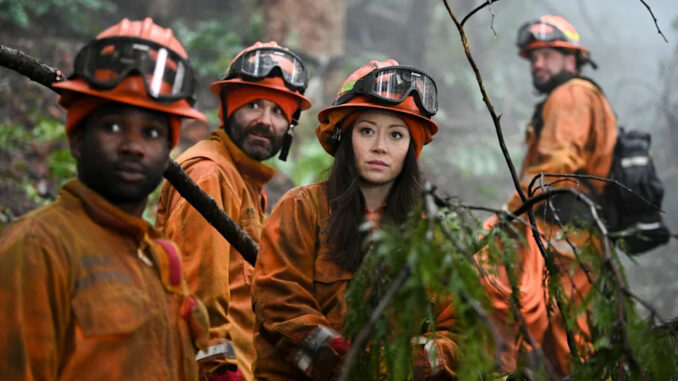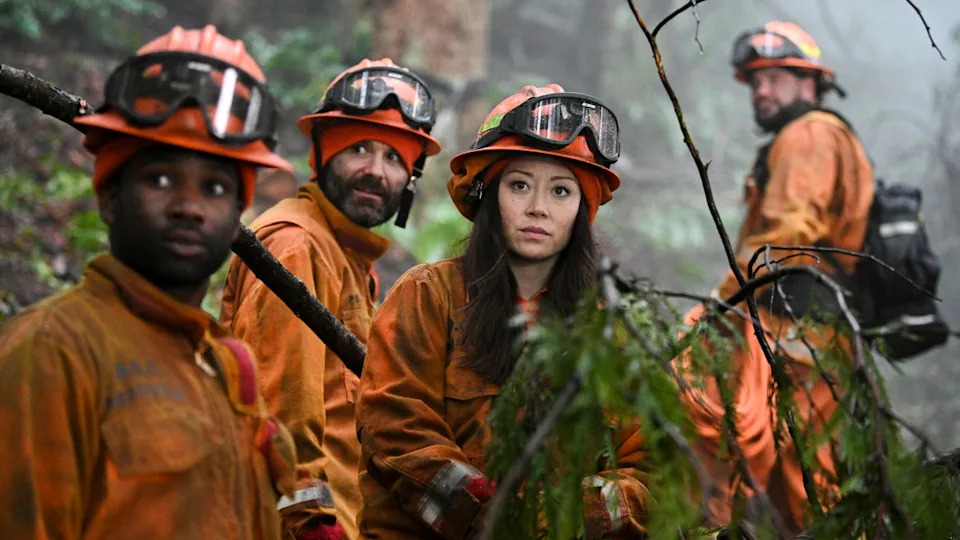
The digital town square was abuzz, a nervous hum preceding a storm. For weeks, the rumors had swirled, whispered in the hallowed halls of fan forums, dissected on social media feeds, and breathlessly speculated upon in countless podcasts. “Fire Country,” the CBS drama that had blazed a trail through the prime-time lineup with its potent mix of high-stakes firefighting, raw emotional redemption, and small-town grit, was preparing for an announcement. Not just any announcement, mind you, but one teased with the ominous descriptor: “game-changing.” Fans, deeply invested in the lives of Bode Leone, the embattled inmate fighting fires and personal demons, and the tight-knit crew of Station 42, braced themselves. What they got, however, was something far beyond mere anticipation – it was a narrative seismic shift that left them, quite literally, speechless.
From its debut, “Fire Country” captured hearts by tapping into universal themes: the search for belonging, the desire for atonement, and the unyielding power of family, both by blood and by choice. Viewers rallied behind Bode’s journey, his struggles a mirror to their own imperfections, his triumphs a beacon of hope. The fires he fought were often metaphors for the internal conflagrations burning within the characters, making the stakes feel profoundly personal. This deep emotional connection forged an unbreakable bond between the show and its audience, transforming casual viewers into ardent devotees who hung on every plot twist, every character development.
The lead-up to the announcement felt like the tense quiet before a prescribed burn, controlled yet brimming with unpredictable potential. Social media feeds became an echo chamber of speculation: a surprise character death? A long-lost family member returning? A spin-off? Each theory was passionately debated, bolstered by snippets from interviews or cryptic tweets from the show’s creators. There was an exhilarating, almost tribal energy, as fans collectively held their breath, united by their shared passion and the impending reveal.
Then, with the suddenness of a wildfire’s turn, the announcement landed. It wasn’t merely a plot twist; it was a narrative earthquake. Perhaps it was a cryptic teaser for the next season, hinting that Bode Leone, the show’s very heart, the prodigal son striving for redemption in the fiery crucible of Edgewater, would be forced to make an impossible choice that would pull him irrevocably away from the very community he fought to rejoin. Or maybe it was the revelation of a character’s betrayal so profound it shattered the foundational trust of the crew. Whatever its precise form, its immediate effect was a collective, digital gasp. Fingers, poised over keyboards, froze. Conversations in buzzing group chats died a sudden, silent death.
The “speechless” moment wasn’t a universal one of joy or despair, but rather a profound, stunned silence born of disbelief and a complete reorientation of expectations. It was the feeling of a rug being pulled out from under a meticulously constructed world, leaving fans momentarily adrift. On Twitter, the initial flurry of excited predictions gave way to single-word exclamations: “WHAT?!”, “NOOOO”, “🤯”. Forums that usually crackled with lively discussion experienced a brief, unprecedented lull, as if every member was processing the sheer magnitude of what they had just heard. It was the kind of announcement that didn’t invite immediate outrage or ecstatic praise, but rather a deep, internal re-evaluation of everything they thought they knew about “Fire Country.”
Slowly, the silence broke. The initial shock gave way to a torrent of emotion. Some fans expressed betrayal, feeling their investment had been upended. Others reveled in the audaciousness of the move, praising the writers for their courage to truly change the game. Theories, wilder and more intricate than before, began to proliferate, attempting to make sense of the new, uncharted territory the show was venturing into. The announcement hadn’t just changed a plot point; it had fundamentally rewritten the rulebook of “Fire Country,” raising the stakes to an unimaginable level and forcing viewers to question the very foundation of its narrative.
This was the true “game-changing” aspect. It wasn’t a minor character arc or a temporary setback. It was a declaration that the core premise, the gravitational pull around which the entire series revolved, was about to shift dramatically. It told fans that the journey they thought they were on was veering onto an entirely new, unpredictable path. It was a bold statement, a challenge thrown down by the creators, daring the audience to come along for a ride that promised to be thrilling, terrifying, and utterly transformative.
The “game-changing announcement” from “Fire Country” wasn’t just news; it was an event. It perfectly illustrated the profound power of storytelling to captivate, to connect, and to utterly upend expectations. It demonstrated the raw, visceral connection between a television show and its audience, a bond so strong that a single announcement could silence thousands, only to reignite their passion with even greater intensity. In that shared moment of digital speechlessness, fans were reminded that even in a familiar world, true storytelling always holds the power to surprise, to shock, and to leave an indelible mark on the collective imagination. And as the dust began to settle, one thing was clear: the fire was far from out, and its path was now more unpredictable than ever.
